
Alphabetical Menu
Chronological Menu
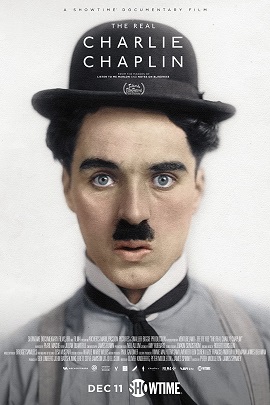
The Real Charlie Chaplin, directed by Peter Middleton and James Spinney, is an illuminating doc about iconic actor/filmmaker Charlie Chaplin. It's not a hagiographical biopic nor is it a thorough look at this life and work. Instead, the filmmakers try to get a sense of what Charlie Chaplin was really like as a human being. Through archival footage and audio interviews with Chaplin, The Real Charlie Chaplin provides the audience with a sense of what his personality was like, his flaws and his struggles. He wasn't a good father and was abusive toward women, many of whom were much younger than him---teenagers, even. Fortunately, the doc doesn't judge him, so it leaves that judgement up to the audience. The narration by Pearl Mackie merely states the facts while guiding the audience through moments from Chaplin's life. It's also worth mentioning that there's no excessive use of clips from Chaplin's films, i.e. The Kid and City Lights, but there's just enough clips used to buttress the film's insights without leading to repetitiveness. The access to some of the footage and audio clips alone are among the film's many strengths. The same can be said for how the editing combines it all in a way that doesn't become dull at any point. If you thought you knew who Chaplin was, think again. There's more to him than meets the eye and he was a complicated, elusive man who probably barely even knew himself and had issues with his own identity. This isn't a psychological study of Chaplin, but it does come close to feeling like one because what's certain, by the time the end credits roll, is that Chaplin was a deeply disturbed human being. That doesn't change the fact that he's a brilliant comedian and hysterically funny, but it does make you wonder how modern day "cancel culture" and social media might've affected his life and career. Perhaps his downfall would have occurred sooner. By the end of the doc, Charlie Chaplin remains icon albeit a very flawed one who's far from likable as a human being, but he's a human being nonetheless. At a running time of 1 hour and 54 minutes, The Real Charlie Chaplin is well-edited, provocative and insightful. It opens at Cinema Village via Showtime Documentary Films on November 19th, 2021 before airing on Showtime on December 11th, 2021. 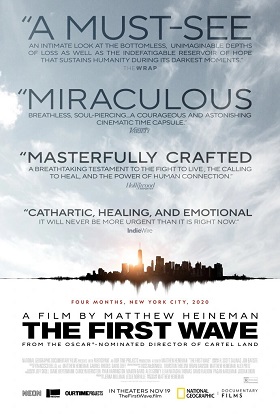
The First Wave hits just as hard emotionally as a war documentary. In a way, it is about war, but the enemy is a silent one: COVID-19. Director Matthew Heineman films the nurses, doctors and COVID patients at Long Island Jewish Medical Center in New York City during the first four months of the pandemic, March 2020 to June 2020. It's unflinching, immersive and emotionally devastating which is precisely what a documentary about such a tragic event ought to be. Heineman deserves to be commended for gaining so much access to his subjects right inside the medical center and for putting a human face to the pandemic. To watch The First Wave while still in the middle of a pandemic isn't an easy experience because it asks the audience to confront painful emotions and memories, but by confronting our painful memories, we're at least on the path toward overcoming that pain. Also, it's important not to forget the past no matter how difficult it might be to confront it on an emotional level. The First Wave looks at the first wave of the pandemic head-on and asks the audience to do that same, so be prepared for a lot of intense moments. Fortunately, the documentary doesn't focus just on despair and suffering; there's also some hope, perseverance and even a little joy. Also, the cinematography looks terrific with some breathtakingly poetic shots of New York City which adds not only style, but also makes the film more cinematic. At a running time of 1 hour and 34 minutes, The First Wave is brave, profoundly moving and unforgettable. It's a powerful, unflinching and vital documentary. The First Wave opens at Quad Cinema and AMC Empire via National Geographic Documentary Films and NEON. Bad Luck Banging or Loony Porn 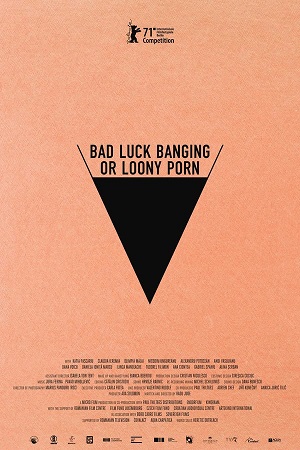
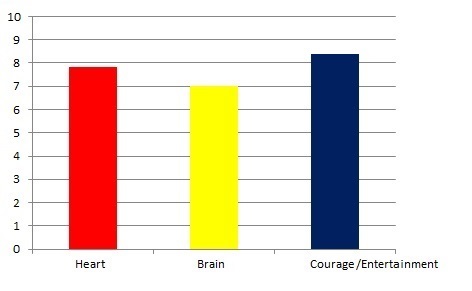 The Battle at Lake Changjin 
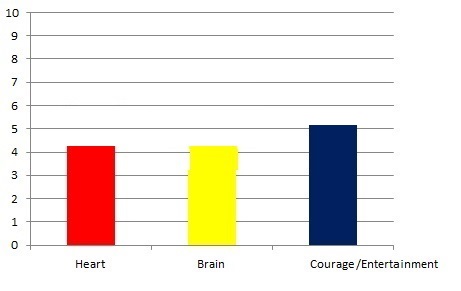 Black Friday 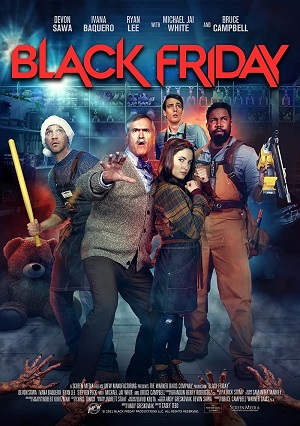
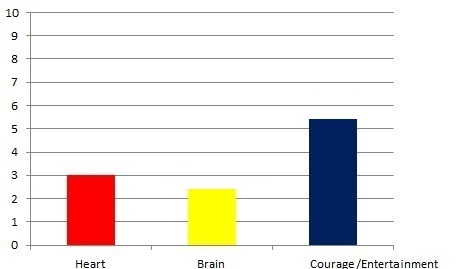 Boiling Point 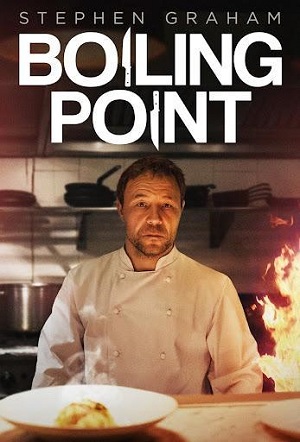
Andy Jones (Stephen Graham), the head chef and owner of a London-based restaurant, struggles to deal with the stress that he faces at work. A food critic, Sara Southworth (Lourdes Fabares), shows up with her date, Alastair Skye (Jason Flemyng), who happens to be a celebrity chef. Another patron has a nut allergy which frustrates one of the waitresses. A health inspector also shows up and finds some violations that puts Andy's restaurant at risk of being shut down if he fails to correct them for the next inspection. Meanwhile, he's also going through a separation from his wife. If you can imagine In the Loop being a behind-the-scenes look at a restaurant minus the profanity and comedy, but with the same intensity, you'll have a rough idea of what Boiling Point is like. to the restaurant industry like what In the Loop without all the comedy and profanity, but it's just as intense and unflinching. The screenplay by writer/director Philip Barantini and co-writer James Cummings follows Andy Jones over the course of one night. They do a great job of getting inside the mind of Andy as he deals with escalating pressure, a lot of anger and frustration. He's going through so much, so fast that he's like a pot of hot water that's gradually inching toward its boiling point. It helps if you've worked at a restaurant kitchen before which would allow you to relate to the seemingly minute details that drive Andy, as well as the health inspector crazy, but anyone can relate to stress. Boiling Point seems less concerned about developing its characters and their relationships than about merely giving audiences a snapshot of their experiences. You never get to meet Andy's wife and know very little about what their marriage was like before their separation, but you know enough that allows the film to humanize Andy. He's juggling many emotions concurrently and he's not always likable, but he's nonetheless a human being, albeit a flawed one that's an emotional mess. The filmmakers wisely don't ask the audience to judge him, but just to experience him. So much happens to him throughout the film that there's very little time to judge him anyway. It would be safe to say that he's undergoing a sort of midlife crisis and that his experiences at work are merely a microcosm of a greater problem in his life. He makes for a very interesting character even if there's not much exposition that provides much backstory about him. To be fair, the screenwriters do go a little overboard in the third act with an event that increases the intensity of the drama even more, but it's unnecessary, a bit contrived and telegraphed from the very beginning if you pay attention to an important detail in the first ten minutes. Boiling Point often seems like a documentary similar to the way In the Loop does because of how it's shot and how it follows its characters around. The audience feels like a voyeur more often than not. The camerawork along with the editing and fast pace helps to invigorate the film and make it palpable intense. Most importantly, though, the filmmakers are lucky to have Stephen Graham as the lead because he gives a strong performance that breathes life into the character and provides him with an inner life even when the screenplay comes up a bit short when it comes to that. Interestingly, even though Boiling Point takes place at a fancy restaurant, it's not a foodie movie and doesn't have many shots of scrumptious-looking food. It's no Big Night nor does it try to be. At a running time of 1 hour and 32 minutes, Boiling Point is intense, emotionally engrossing and unflinching with a bravura performance by Stephen Graham. 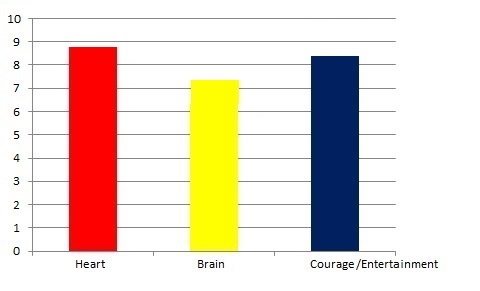 C'mon, C'mon 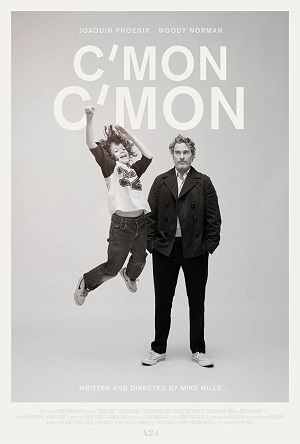 Johnny (Joaquin Phoenix) works as a radio journalist in Los Angeles. He agrees to travel all the way to New York City to take care of his 9-year-old nephew, Jesse (Woody Norman), while his sister, Viv (Gaby Hoffmann), has to spend time with her ailing husband, Paul (Scoot McNairy). To describe the plot of C'mon, C'mon wouldn't be fair not just because it has a thin plot, but because it's not really about its plot. The screenplay by writer/director Mike Mills is more about the relationship between Johnny and his nephew, Jessie, and how they affect each other throughout their adventures in New York. Even labeling it as a comedy or drama wouldn't do it any justice. It's fundamentally a slice-of-life with shades of A Thousand Clowns. Mills resorts to some cliches, like the fact that Jesse is a precocious child, but there's some truth to cliches and it's a cliche to complain about cliches anyway. Of course, there's a scene where Johnny briefly thinks that he lost Jesse for good in the city and wanders around looking for him. Of course, it's no surprise that he finds him and that the experience changes Johnny. C'mon, C'mon isn't really about big plot surprises, even though it does have a small surprise toward the end. Mills wisely grounds the film in the bond between Johnny and Jesse. It's equally fascinating and moving to watch how their relationship evolves. It feels natural which makes it all the more engrossing on an emotional and human level. Fortunately, Mills avoids schmaltz and melodrama, and the profound moments that include some aphorisms don't feel preachy. He mixes some documentary footage of kids talking to the camera that Johnny points at which blurs the line between reality and fiction. Mills should be commended for trusting the audience's patience. To be fair, C'mon, C'mon takes a little time for its narrative momentum to get going, but once it sets up its exposition and Johnny starts spending time with Jesse, it takes off without taking a nosedive at any point like some films do. Unlike Kenneth Branagh who directed Belfast, Mills grasps the importance of understatement, subtlety, and that less is more. He doesn't hook the audience right away, but gradually, while letting the film grow on the audience, so he doesn't try too hard to please the audience like Branagh does in Belfast. C'mon, C'mon uses black-and-white cinematography like Belfast without relying on style overshadowing other essential elements like emotions. In other words, it offers both style and substance, and its style sometimes becomes part of its substance. New York City becomes like a character in itself, much like in A Thousand Clowns. There are a number of breaktaking shots of the city that make it look poetic, i.e. the scenes in Central Park. Mills is also unafraid to dig deeper and delve into the darker themes which rise to the surface later on. Jesse goes through an emotional and psychological journey, but so does Johnny. In a way, Johnny behaves like a child because he has a lot of growing up to do. By the end of the film, he's changed somewhat or at least there's some hope for him to change since he does show signs of emotional maturity. That makes both him and Jesse interesting characters and all the more human. Joaquin Phoenix gives a raw, emotionally resonating and nuanced performance. It's refreshing to see him in a role that doesn't require him to go over-the-top in any way. He also does a great job of showing Johnny's emotional pain beneath the surface. Woody Norman gives a breakthrough performance. He's charismatic, radiant and has great chemistry with Joaquin Phoenix. At a running time of 1 hour and 48 minutes, C'mon, C'mon is a heartfelt, wise and profound emotional journey. It's just the right antidote to the cloying and pandering Belfast.
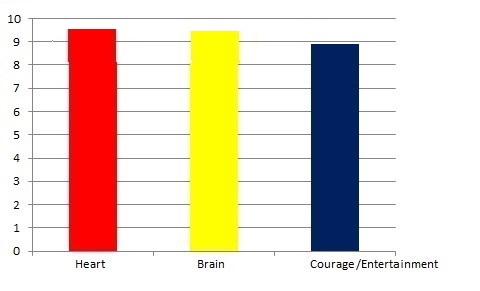 The Feast 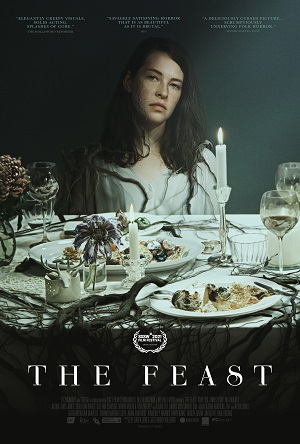 A wealthy family hires a young woman, Cadi (Annes Elwy), to help them at a dinner party at their remote home located in the Welsh mountainside. The family members include Glenda (Nia Roberts) and her husband, Gwyn (Julian Lewis Jones), and their sons, Guto (Steffan Cennydd) and Gweirydd (Sion Alun Davies). They invite Delyth (Caroline Berry), the wife of a farmer, to join their festivities, but the dinner doesn't quite go as planned.
Without revealing what happens at the dinner party, The Feast begins as a psychological thriller before turning into a horror thriller. Screenwriter Roger Williams knows how to build up the tension as he creates a sense of unease and creepiness during the first hour. The suspense feels Hitchcockian because the audience anticipates that something tragic and horrifying will inevitably happen, but they don't know precisely when, why or how. Who is Cadi and why did she agree to help this particular wealthy family in the middle of nowhere? The answer to that question and others get answered eventually, so patient audiences will be rewarded by The Feast the most. Williams also trusts the audience's imagination because for that first hour, The Feast's horror can be found in the mind of the audience as they imagine what's to come. Something feels off-kilter from the very first scene when Cadi shows up. The mystery and suspense wanes during the last 30 minutes with excessive flashbacks are awkwardly integrated as a form of exposition. Once it becomes clear who Cadi is, what her intentions are and why she chooses to do what she does, the film kicks up its horror gears full throttle and goes over-the-top, even more than Parasite. It's as shocking, dark and disturbing as the ending of Suspiria. Fortunately, at least the screenplay provides enough of a backstory that humanizes Cadi and turns her into a character who's much more than meets the eye. The Feast's visual style is one of its many strengths. Just the fact that it takes place in a house in the middle of nowhere already makes it creepy, albeit a bit cliched---how many horror films don't take place in an isolated home? The use of color, lighting and camera angles are also interesting. It's also worth mentioning the sound design and the soundtrack which add both style and substance, i.e. when a song at the beginning is interrupted by the sound of Gwyn hitting something with his axe. That interruption occurs so quickly that it comes as a shock while serving as a foreshadow of the events to come. When the blood begins to spatter after the hour mark, The Feast leaves nothing to the imagination when it comes to the horrific violence. There's even one scene that's as disgusting and icky as the controversial scene in The Cook, the Thief, His Wife and Her Lover. This isn't the kind of horror film for those of you who have a weak stomach, so please keep that in mind. The best way to describe it is that it's Hitchcock meets Dario Argento. The performances are all solid and natural which makes the film feel all the more grounded in reality before the supernatural elements rise to the surface. At a running time of 1 hour and 33 minutes, The Feast is spellbinding, provocative and deeply unnerving. It's one of the most terrifying horror films of the year. 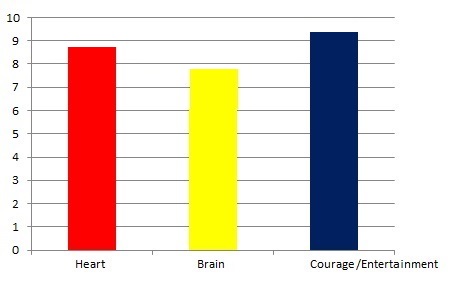 Ghostbusters: Afterlife 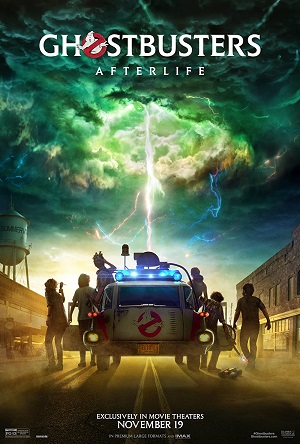 Callie (Carrie Coon) and her two kids, Phoebe (Mckenna Grace) and Trevor (Finn Wolfhard), move to a farmhouse that she inherited after her recently deceased, estranged father. Phoebe, a proud science geek, attends summer school where she befriends a classmate who loves science too and himself Podcast (Logan Kim). Trevor flirts with a waitress, Lucky (Celeste O’Connor), while Callie dates Phoebe's summer school teacher, Mr. Grooberson (Paul Rudd), but soon something strange--or, more accurately, supernatural--happens in the neighborhood that threatens their lives. Ghostbusters: Afterlife suffers from the same problem that Space Jam: A New Legacy suffers from: it might've well have been called Easter Egg: The Movie because of how it bombards the audience with many Easter Eggs. The screenplay by writer/director Jason Reitman and Gil Kenan spends too much time paying homage to the classic original from 1984 that it never quite takes off to become its own exciting Ghostbuster film. Everything seems tacked-on, throwaway and filler, including the romance between Callie and Mr. Grooberson, Trevor and Lucky, and the friendship between Phoebe and Podcast. Worst of all, the sci-fi/mystery element barely generates any suspense and takes a while until it even kicks into full gear. Once it does, it's neither fun, imaginative nor even remotely scary, but it does veer closely toward camp in the brief scenes with Olivia Wilde who's nearly unrecognizable. Instead, it becomes dull at times and silly at other times. The attempts at comic relief feel equally contrived, forced and clunky, i.e. when Phoebe tries to make others laugh with what's essentially dad jokes that are more amusing than funny. Does she really have to say 3 jokes one right after the other? It comes across as lazy screenwriting that's too desperate for laughs and, ultimately, dehumanizes Phoebe. What kind of a child tells so many dad jokes? Then there's the character of Podcast who talks a mile-a-minute as though he were in a 1930's screwball comedy. He becomes increasingly annoying like nails on a chalkboard. Moreover, the screenwriters do a less than adequate job when it comes to exposition, so if you haven't seen the original, you might end up with many unanswered questions and will surely miss all of the Easter Eggs. Ghostbusters: Afterlife remains moderately entertaining thanks to its talented cast, especially Carrie Coon who provide the film's brief heartfelt moments with her convincingly moving performance. If you want to see her shine in a much better film, watch The Nest. McKenna Grace is wonderful as usual and does a great job of displaying her character's innate courage much like Millicent Simmonds does in the far more gripping and intense A Quiet Place: Part II. Paul Rudd is also well-cast and adds some of his charisma like he always does. The cameos with Bill Murray, Dan Aykroyd and Ernie Hudson reprising their roles are amusing for nostalgia purposes, but beyond that their performances just seem bland, and they lack the spark they had together in the original. If their mere presence is enough for you to enjoy the film and that's all that it takes to satiate your appetite for Ghostbusters, then perhaps Ghostbusters: Afterlife was made for you. If you're looking for an exciting sci-fi action comedy that leaves you eager for more once the end credits roll, you'll be disappointed. Even the CGI is decent, but nothing out of this world. At an excessive running time of 2 hours and 4 minutes, Ghostbusters: Afterlife is underwhelming, lazy and just mildly entertaining. There's not much to see in this neighborhood. 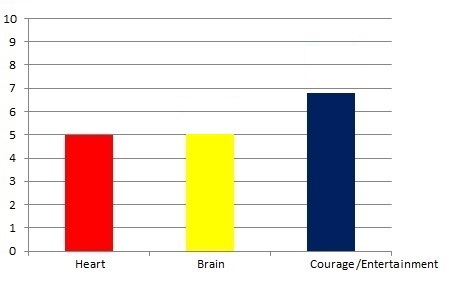 Hide and Seek 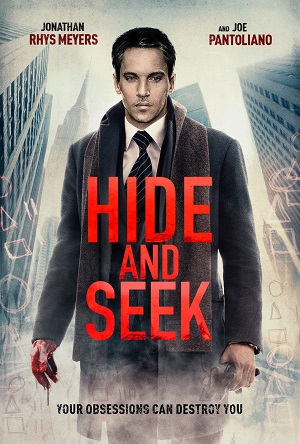 Noah Blackwell (Jonathan Rhys Meyers) lives with his wife (Jacinda Barrett) and two kids in a hotel that he inherited from his late father. After learning his lawyer (Joe Pantoliano) that his estranged brother, Jacob (Josh Alscher), has moved back into town, Noah goes searching for him at his apartment building. He gets caught up in something much darker and life-threatening when he meets his brother's landlord, Frankie Pascarillo (Mustafa Shakir). Based on the South Korean film of the same name, the screenplay by writer/director Joel David Moore is a thriller that lacks suspense, thrills and emotional depth despite an intriguing premise. The relationship between Noah and his estranged brother remains underdeveloped with not enough backstory which makes it hard for the audience to be emotionally invested in Noah's quest to find his brother. Too many scenes feel contrived and shallow as though they were just there to move the plot forward rather than to stop and breathe life into the characters. These characters are human beings after all, but they seem like one-dimensional caricatures. There's not enough of a window into Noah's heart, mind and soul. If Hide and Seek were just a mindless action thriller, that would be forgivable because at least it would've been entertaining on a visceral level. However, instead, it becomes an increasingly dull and monotonous bore where even the third act twists don't amount to anything engaging or memorable. There's also not nearly enough comic relief, so monotony sets in pretty quickly. The editing in Hide and Seek looks choppy at times while there's nothing exceptional about its cinematography. Jonathan Rhys Meyers is a solid actor who's capable of handling emotionally complex roles, but he's undermined by the vapid screenplay here and doesn't get a chance to rise above it. His charisma helps to keep the audience slightly engaged, at least. The underrated Joe Pantoliano makes the most out of his scenes as the lawyer, but his role is also underwritten, and talents as an actor are underused. If you want to see him in a far better crime thriller with plenty of style and even a little substance see him in Bound, the wildly entertaining cult classic by Lana and Lilly Wachowski. Then, of course, there's the crime thriller Memento, Christopher Nolan's unforgettable, brilliant mindfuck. Hide and Seek tries to be a mindfuck towards the end, but fails because the audience doesn't have an emotional hook or any other kind of hook to care about what's happening on-screen. Also, the pace moves too quickly, so it's hard for the audience to feel absorbed. At a running time of 1 hour and 40 minutes, which feels more like 3 hours, Hide and Seek, is an anemic, lackluster and forgettable thriller. 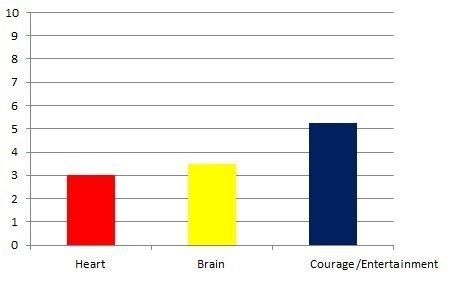 King Richard 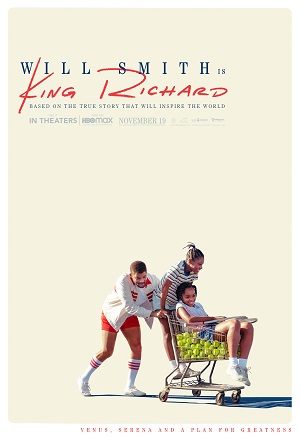 Richard Williams (Will Smith) and his wife, Oracene "Brandy" Williams (Aunjanue Ellis), struggles to make ends meet as they raise their five daughters, Venus (Saniyya Sidney), Serena (Demi Singleton), Yetunde (Mikayla Lashae Bartholomew), Lyndrea (Layla Crawford), and Isha (Daniel Lawson). He has faith that Venus and Serena will one day be successful tennis players and trains them as best to encourage them to keep practicing before he hires coaches, Rich Macci (Jon Bernthal) and Paul Cohen (Tony Goldwyn), to hone their skills and to help them achieve their dreams. King Richard tries to be an inspirational, feel-great family sports drama, but the screenplay by Zach Baylin suffers from on-the-nose dialogue that lacks nuance, subtlety and emotional depth. Like what Branagh does in Belfast, director Reinaldo Marcus Green and screenwriter Zach Baylin try too hard to please the audience while failing to dig at the darker themes as though they were afraid to make the audience feel sad. The best kind of sports dramas are not really about the sport, so at least they understand that and do focus somewhat on the rocky relationship between Richard and his wife, and how Richard's behavior affects his marriage. He's not written as a perfect human being; his personality flaws are shown and he's going through his own emotional battles. King Richard doesn't have enough scenes with him in his more intimate moments or more scenes between him and his wife. It's also heavy-handed and preachy at times, i.e. when Richard makes a not-so-subtle comment to someone that they must be KKK. That line is played for laughs, but what it mostly accomplishes is spoon-feeding the audience without trusting their intelligence or imagination enough. Why baby the audience? Why spell everything out for them instead of leaving more room for interpretation? Another scene that panders to the audience while spoon-feeding them with preachy messages concurrently is when Richard shows Cinderella to wife and daughters, and then asks them afterward what lesson can be learned from the movie. He's essentially telling the audience what lesson to learn from King Richard because it's obvious that King Richard and Cinderella share a rags-to-riches story in common. The lesson is a very basic, oversimplified albeit important one: to be humble. Unfortunately, despite it being mentioned, it doesn't get explored after that scene. Moreover, you never really get to know Venus and Serena enough, either, although the bond between them and their siblings do feel palpable. There aren't enough smaller moments showing them interacting, but the few scenes that do show their bond are quite engaging. Once Venus and Serena rise to fame, King Richard becomes a pedestrian sports drama as it focuses on details of how they rose to fame while forgetting to humanize them. The scenes of the tennis match during the last 30 minutes are riveting, though, even if you already know the outcome. Yet again, those scenes end up pandering to the audience with added tension and drama that feels contrived, unnecessary and tacked-on. The glue that keeps King Richard together are the moving performances. Any of the heartfelt moments don't come from the screenplay, but rather from the performances which do rise a little above the mediocre, vapid, by-the-numbers screenplay. There's nothing wrong with following a formula, to be fair. Every movie is formulaic to a certain degree, so it's all about how the filmmakers hide the seams, so-to-speak, to make it feel organic, true-to-life and, well, seamless. Director Reinaldo Marcus Green and screenwriter Zach Baylin don't quite achieve that, but they get close to it thanks to the honest performances of Will Smith, Aunjanue Ellis and newcomers Saniyya Sidney and Demi Singleton. The music, like the screenplay, does try too hard to tell the audience what to feel at times while holding their hand. The cinematography is solid, but not exceptional. Also, you can feel the weight of the running time of 2 hours and 26 minutes, especially around the 90 minute mark. Ultimately, King Richard is this year's The Blind Side. It's just as inspirational, crowd-pleasing and well-acted, but it's also heavy-handed, shallow and panders to the audience. 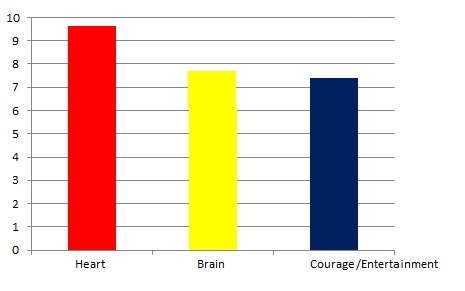 Zeros and Ones 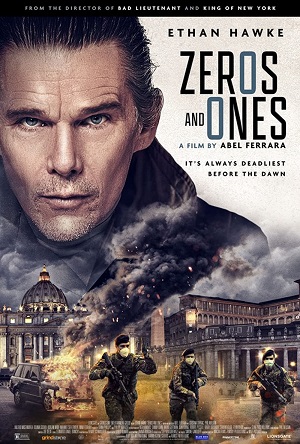 JJ (Ethan Hawke), an American soldier, travels to Rome to stop terrorists from attacking the Vatican. He searches for his twin brother, Justin (also Ethan Hawke), who might know something that could help him to find the terrorists. Although the plot sounds like it could've been an intense suspense thriller, the screenplay by writer/director Abel Ferrara fizzles out within the first thirty minutes as it grows increasingly tedious. Sometimes less is more, but that's not the case here. There's not enough exposition as Ferrara throws the audience right into the meat of the story while skipping the first act that would've set up the story or introduced properly the audience to JJ and his twin brother. Instead, they both seem like merely there to move the wafer-thin plot forward and remain at a cold distance from the audience. Why not get to know them a little more? Why not build the suspense more by providing more information about the terrorists or at least make the investigation more intriguing? There's nothing wrong with going an unconventional route and keeping the mystery of the plot and the characters' true motives enigmatic. Stanley Kubrick did a great job of that with Eyes Wide Shut, but he also developed the toxic relationship between the husband and wife. JJ's relationship with Justin isn't really explored and doesn't really amount to anything intriguing. Then there's the recent creepy drama The Humans which, like Zeros and Ones and Eyes Wide Shut, also doesn't show the villain to the audience while maintaining an ominous atmosphere. The Shining won't even be mentioned here, but even a more Hollywood film like Angels & Demons and Strange Days have more suspense and intrigue than Zeros and Ones which also tries, ineffectively, to combine politics, action and thriller. While Ferrara deserves praise for being bold enough for eschewing convention and for being unafraid to confuse the audience, those strengths are not nearly enough to keep the film from becoming a monotonous and anemic chore to sit through. There's also little to no comic relief or wit, and the third act feels anticlimactic. Zeros and Ones has stylish cinematography that, much like the rest of the film, becomes repetitive. It's hard to even see what's happening in some of the nighttime scenes with all the graininess. Ethan Hawke gives a decent performance, or rather, performances, but he's undermined by the weak screenplay that fails to bring either of his characters to life. He bookends the film by talking directly to the audience as Ethan Hawke, not as his character, which breaks the fourth wall, but since JJ never becomes a lived-in character and it's hard to even be emotionally invested in the film, there's not much of a wall to break to begin with. Without enough style and barely any substance, Zeros and Ones is a tedious and dull bore that's more mind-numbing than mind-fucking. 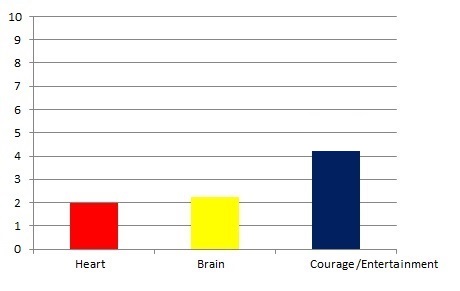 |